When evaluating a team’s chances to win the Stanley Cup, teams are often judged based on the status of their “window”. A rebuilding team’s window would be closed, but on its way to opening as they acquire young talent and build for the future. Contenders are said to have an open window. In a four-part series, I will be putting each NHL team into one of four categories to evaluate their “window”. The categories are:
- Closed: This team is not a Stanley Cup contender, and with the current state of their franchise, they are not going to be a contender at any point in the next few years.
- Open: This team is among the favorites to win a Stanley Cup this year, and they should be in a prime position to contend for the next few years.
- Closing: This team has a chance to win a Stanley Cup this year or next, but if they do not, they may not be contenders in the years following. Whether it’s salary cap problems, or aging of key players, they may have one last push left. But beyond that, it’s questionable.
- Opening: This team is filled with young, up-and-coming players. They won’t be a top seeded playoff team, but will make the playoffs, and could make some noise with an upset of a contender in the first few rounds. In a few years, if things go right, they will be graduating to the open category.
Breaking Down the Central Division
Colorado Avalanche: Opening
In Patrick Roy’s first year as coach, the Avalanche underwent a shocking resurgence. After picking first overall in the 2013 draft, they finished with third most points in the league in 2013-14. Their success was led by a dynamic, young group of forwards that includes Nathan MacKinnon, Gabriel Landeskog, Ryan O’Reilly, and Matt Duchene. Only three other teams, and one in the Central Division, scored more goals than the Avalanche.
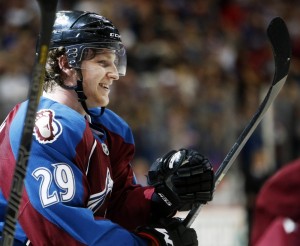
On defense, Patrick Roy was able to take a group of mostly no-names and get some results. Erik Johnson and Jan Hejda were proven quantities, but Andre Benoit, Nate Guenin, and Nick Holden had just 80 combined games of NHL experience entering last season, despite having an average age of 28.
The Avs finished 15th in goals against, but that had a lot more to do with Semyon Varlamov than the performance of the defense. Varlamov had a breakout year after showing flashes of potential in Washington. He finished 2nd in Vezina trophy voting, and 4th in Hart Trophy voting.
The glaring weakness in Colorado is the defense. The continued maturation of Tyson Barrie, and youngsters Chris Bigras, Duncan Siemens, and Stefan Elliott should help, however. The forwards are downright scary, and are only going to get better.
St. Louis Blues: Open
Despite having (or being on pace for) over 100 points the past three seasons, the Blues have not advanced past the second round of the playoffs. They thrive in the regular season, but struggle in the postseason.
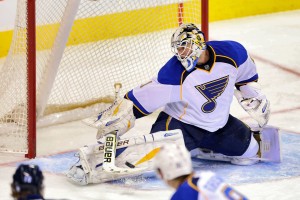
The Blues finished with the 7th best offense and 3rd best defense in 2013-14. Up front, they lack a franchise forward but have remarkable depth. The lack of a true #1 center is the one big knock against the Blues.
On defense, they have arguably the best top 3 in the league. Alex Pietrangelo and Jay Bouwmeester would both be #1 defensemen on a majority of NHL teams, and both were top 15 defensemen in the league last year. After those two, Kevin Shattenkirk is one of the best offensive defensemen in the league, and the depth beyond is solid.
In goal, the Blues decided to move on from both Jaroslav Halak and Ryan Miller, giving the reigns to Brian Elliott and Jake Allen. It remains to be seen whether Elliott is a true #1 goalie, as he has never started over 50 games and delivered good numbers. Allen has been plying his trade in the AHL over the past 4 years, and was named the best goalie in the AHL last year. He is the netminder of the future in St. Louis.
There is no doubting the talent that St. Louis possesses. However, they need to prove that they can translate regular season success to a deep playoff run, or Ken Hitchcock will be out of a job soon.
Chicago Blackhawks: Open
The winner of two of the last five Stanley Cups, you can never count the Blackhawks out of it. They had the second most prolific offense in the league last year, and the forward corps has remained mostly intact.
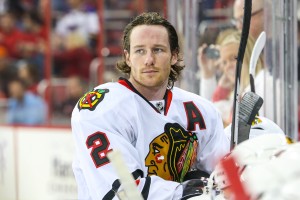
On defense, the Blackhawks are neck and neck for the Blues for best top 3 in the Central Division (and the NHL). Duncan Keith is the best defenseman in the league, and is a one-man breakout machine. Brent Seabrook, Niklas Hjalmarsson, and Johnny Oduya round out a very strong top four.
In net, Corey Crawford is serviceable (albeit overpaid at $6 million a year). He gets the job done, but is mostly a product of the team in front of him. The team in front of him is so talented that he just has to be above average, and this team can win the cup.
One concern for the Blackhawks is that they are going to have massive salary cap problems after this season. Despite the fact that they are going to have to gut their depth like they did after 2009-10, they will remain contenders. A team with Jonathan Toews, Patrick Kane, and Duncan Keith will always be a threat.
The scary thing about the Blackhawks is that they have a number of quality, NHL-ready prospects in the pipeline. On another team, Adam Clendening and Jeremy Morin are likely already contributing NHL players. But, they have been stuck in the AHL due to Chicago’s depth.
There will be some roster turnover to deal with, but the Blackhawks will remain in the NHL’s elite for the foreseeable future.
Minnesota Wild: Opening
Under coach Mike Yeo, the Wild play their system very well and have an identifiable style that they play effectively. It allowed them to upset the #2 seed Avalanche in the opening round of the playoffs last year.
Up front, the Wild have some good pieces to work with in Zach Parise, Mikko Koivu, Jason Pominville, and Mikael Granlund. Despite having the talent, they struggled to score goals last year, finishing 24th in the league. In Yeo’s system, the Wild do not need to be an offensive powerhouse. But, they need to be better than 24th.
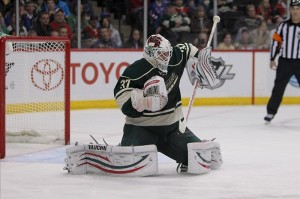
The defense is anchored by the minute-munching Ryan Suter, who averaged over 29 minutes on the ice per game, more than two minutes longer than second place Erik Karlsson. Jonas Brodin is a budding stud defenseman, and Jared Spurgeon is a strong second pairing option. The NHL depth after them leaves a bit to be desired, but their top three is strong and Matt Dumba and Chrisitan Folin are on the way.
In goal, the Wild don’t have any shortage of options. However, it’s difficult to figure out who the Wild’s #1 goalie will be. Nicklas Backstrom is under contract for 2 more years, but is not the goalie he was a few years ago. Josh Harding was remarkable last year, leading the league in GAA and SV%. But, he played in just 29 games due to complications with his bout with Multiple Sclerosis. Harding is by far their best goalie, but they don’t know that he will be consistently healthy.
Darcy Kuemper looks like he could be a starting goalie in the NHL, but is currently unsigned, and will lose his waiver exemption if he plays 14 more NHL games. If the Wild make him the starter, they will have to carry 3 goalies on their roster, or risk losing one on waivers.
Dallas Stars: Opening
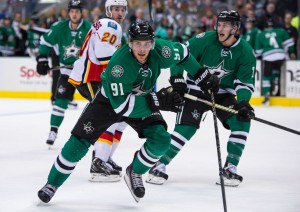
The three-headed monster of Jamie Benn, Tyler Seguin, and Jason Spezza gives the Stars a lot to work with offensively. Add in budding star Valeri Nichushkin, and it’s easy to see that scoring goals will not be a problem for Dallas.
The question for Dallas is going to be how they keep pucks out of their net. Alex Goligoski had a breakout campaign, and is the anchor of the group alongside Trevor Daley. But if the Stars are to become true contenders, the blueline needs to improve. You aren’t going to win any cups with Goligoski as your best defenseman. Julius Honka and Jamie Oleksiak are both good prospects, but do not project to be elite defensemen.
In goal, the Stars are committed to Kari Lehtonen at $5.9 million for four more seasons. Lehtonen has been a workhorse over the past 4 years, playing the 4th most games among goalies. It remains to be seen whether he can take a team to the promised land, as his numbers in the playoffs are awful. Jack Campbell is one of the best goaltending prospects in the league, and is the goalie of the future in Dallas. Look for him to be eased into the starting role over the next few years.
Nashville Predators: Closed
A look through the list of forwards that the Predators currently have under contract does not inspire confidence. It’s a hodgepodge of mostly good third line forwards, and veterans whose best years are behind them. Then there’s James Neal. Under Peter Laviolette, the Predators will certainly focus more on offense compared to the Barry Trotz days, but this team is lacking in pure skill up front.
To their credit, the Preds have attempted to address the problem by adding Kevin Fiala, Filip Forsberg, and Calle Jarnkrok. The Preds will need to hit home runs with all 3 to get their offense to contender level.
Despite defense being the hallmark of Barry Trotz coached teams, the Predators gave up the 8th most goals in the league last year. A top three of Shea Weber, Roman Josi, and Seth Jones will patrol the Nashville blueline for years to come, and could one day be the best in the league.
In goal, Pekka Rinne will be making $7 million a year for the next five years. Over the past two years, Rinne has performed well below what you would expect considering his price tag. After back-to-back top 3 finishes in Vezina voting in 2010-11 and 2011-12, he has yet to record a GAA below 2.40 or SV% above .910 since. If the Preds are going to contend, Rinne needs to get back to his Vezina level play.
Winnipeg Jets: Closed
In Winnipeg, the exuberance of getting an NHL team back has worn off, and the fans are demanding results. However, Kevin Cheveldayoff’s complacency and reluctance to make big moves have left the Jets in a holding pattern. In their 3 years in Winnipeg, they have not made the playoffs, and finished 9th, 11th, and 11th in the conference. As a bubble team, they aren’t making the playoffs, or getting top draft picks.
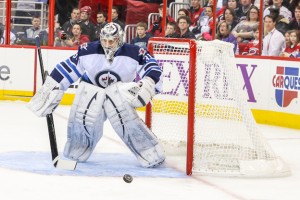
At forward, the Jets were perfectly average last year, finishing 15th out of 30 teams. They have a number of solid pieces in Evander Kane, Blake Wheeler, and Bryan Little, but lack a star forward. Dustin Byfuglien will be returning to forward in 2014-15, but does not possess the gamebreaking talent the Jets need.
The one strong suit of the Jets is defense. The presence of Jacob Trouba, Tobias Enstrom, and Zach Bogosian made Byfuglien a luxury on defense, so they moved him to forward. The defense is the one aspect of the Jets that is currently of cup contender quality.
In his 5 seasons as a starter, Ondrej Pavelec has proven to be extremely mediocre, and is the worst starter in the Central Division. He has recorded a SV% above .910 just once, and has never had a GAA below 2.70. The Jets aren’t going anywhere with Pavelec in net. Connor Hellebuyck showed great promise at UMass Lowell, but is at least a few years away from possibly being an NHL starter.
I agree with you on a lot of this, but I will disagree with you on your assessment of the Nashville Predators. Sure, my bias may come into play, but I’m trying to stay as neutral as I can. Surely they’re a contender for the final wild card spot, right?
Don’t forget, the Preds were only 3 points out of a playoff spot last year without Pekka Rinne for most of the season. Also, they added a new coach and James Neal to assist in offensive production. The pieces aren’t there to win a Stanley Cup, but they can make the postseason.
One of the most exciting divisions in hockey!